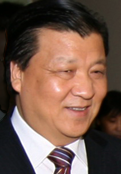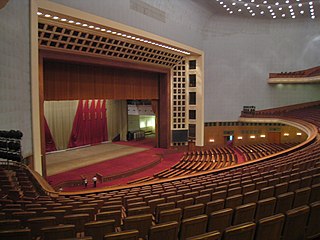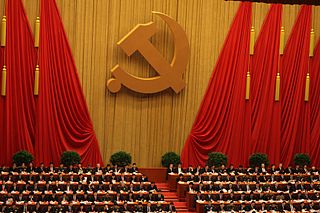
The Politburo of the Chinese Communist Party, officially the Political Bureau of the Central Committee of the Communist Party of China, is the highest political body of the Central Committee of the Chinese Communist Party.

The Politburo Standing Committee (PSC), officially the Standing Committee of the Political Bureau of the Central Committee of the Communist Party of China, is a committee consisting of the top leadership of the Chinese Communist Party (CCP). Historically it has been composed of five to eleven members, and currently has seven members. Its officially mandated purpose is to conduct policy discussions and make decisions on major issues when the Politburo, a larger decision-making body, is not in session. According to the party's constitution, the General Secretary of the Central Committee must also be a member of the Politburo Standing Committee.

The general secretary of the Central Committee of the Chinese Communist Party is the leader of the Chinese Communist Party (CCP), the sole ruling party of the People's Republic of China (PRC). Since 1989, the CCP general secretary has been the paramount leader of the PRC.

The Secretariat, officially the Secretariat of the Central Committee of the Communist Party of China, is a body serving the Chinese Communist Party (CCP)'s Politburo and Standing Committee. The secretariat is mainly responsible for carrying out routine operations of the Politburo and coordinating organizations and stakeholders to achieve tasks set out by the Politburo. It is empowered by the Politburo to make routine day-to-day decisions on issues of concern in accordance with the decisions of the Politburo, but it must consult the Politburo on substantive matters.

Li Keqiang was a Chinese economist and politician who served as the premier of China from 2013 to 2023. He was also the second-ranked member of the Politburo Standing Committee of the Chinese Communist Party (CCP) from 2012 to 2022. Li was a major part of the "fifth generation of Chinese leadership" along with Xi Jinping, the CCP general secretary.

Liu Yunshan is a retired Chinese politician. He was a member of the Politburo Standing Committee of the Chinese Communist Party, the top decision-making body of the CCP, between 2012 and 2017; he was broadly tasked with the work of the party's secretariat, overseeing propaganda and ideological indoctrination, as well as party organization, in addition to serving as President of the Central Party School.

The 17th National Congress of the Chinese Communist Party was held in Beijing, China, at the Great Hall of the People from 15 to 21 October 2007. Congress marked a significant shift in the political direction of the country as CCP General Secretary Hu Jintao solidified his position of leadership. Hu's signature policy doctrine, the Scientific Development Concept, which aimed to create a "Socialist Harmonious Society" through egalitarian wealth distribution and concern for the country's less well-off, was enshrined into the Party Constitution. It was succeeded by the 18th National Congress of the Chinese Communist Party.
The mass line is a political, organizational, and leadership methodology developed by Mao Zedong and the Chinese Communist Party (CCP) during the Chinese Communist Revolution. Who used the term first is disputed, with some crediting Li Lisan and others Zhou Enlai. In mass line methodology, leadership formulates policy based on theory, implements it based on the people's real world conditions, revises the theory and policy based on actual practice, and uses that revised theory as the guide to future practice. This process is summarized as leadership "from the masses, to the masses", repeated indefinitely.

The Organization Department of the Central Committee of the Chinese Communist Party is the human resource management department of the Central Committee of the Chinese Communist Party (CCP) that controls staffing positions within the CCP.

The 18th National Congress of the Chinese Communist Party was held November 8–14, 2012 at the Great Hall of the People. Due to term limits and age restrictions, seven of the nine members of the powerful Politburo Standing Committee (PSC) retired during the Congress, including Hu Jintao, who was replaced by Xi Jinping as General Secretary of the Chinese Communist Party. The Congress elected the 18th Central Committee of the Chinese Communist Party, and saw the number of Politburo Standing Committee seats reduced from nine to seven.
The history of the Chinese Communist Party began with its establishment in July 1921. A study group led by Peking University professors Chen Duxiu and Li Dazhao to discuss Marxism, led to intellectuals officially founding the Chinese Communist Party (CCP) in July 1921. In 1923, Sun Yat-sen invited the CCP to form a United Front, and to join his nationalist party, the Kuomintang (KMT), in Canton for training under representatives of the Communist International, the Soviet Union's international organization. The Soviet representatives reorganized both parties into Leninist parties. Rather than the loose organization that characterized the two parties until then, the Leninist party operated on the principle of democratic centralism, in which the collective leadership set standards for membership and an all-powerful Central Committee determined the party line, which all members must follow.

Li Weihan was a Chinese Communist Party politician. After pursuing his studies in France in 1919–20, he returned to China for the first National Congress of the Chinese Communist Party in Shanghai in 1921. He became a member of the 6th Politburo of the Chinese Communist Party in 1927 but fell out of favour shortly afterwards in the wake of the unsuccessful Autumn Harvest Uprising in junction of Hunan and Jiangxi provinces. When he sought to bring the uprising to an end, he found himself accused of cowardice. Li was eclipsed until reemerging in the early 1930s as a supporter of Li Lisan, a leading figure in the CCP at the time, and an opponent of the anti-Mao 28 Bolsheviks faction.

The Xi–Li Administration was the administration of China from 2013 to 2023. Xi Jinping and Li Keqiang succeeded Hu Jintao and Wen Jiabao after the 12th National People's Congress.
The succession of power in China since 1949 takes place in the context of a one-party state under the Chinese Communist Party (CCP). Despite the guarantee of universal franchise in the constitution, the appointment of the Paramount leader lies largely in the hands of his predecessor and the powerful factions that control the Central Committee of the Chinese Communist Party.

The secretary of the Central Commission for Discipline Inspection (CCDI) is the head of the aforementioned body. The office is a leading political position, and the officeholder has been a member of the Politburo Standing Committee, the highest decision-making body of the Chinese Communist Party, since 19 September 1997. The current secretary is Li Xi, who was elected by the 1st Plenary Session of the 20th Central Commission for Discipline Inspection on 23 October 2022 and approved by the 20th Central Committee on the same day. The role is roughly analogous to that of the Chairman of the Central Control Commission in other communist countries.
The 18th Politburo of the Chinese Communist Party (CCP), formally the Political Bureau of the 18th Central Committee of the Communist Party of China, was elected at the 1st Plenary Session of the 18th Central Committee of the CCP on 15 November 2012 in the aftermath of the 18th National Congress. This electoral term was preceded by the 17th Politburo and succeeded by the 19th. Of the 25 members, seven served in the 18th Politburo Standing Committee.
The Resolution of the CPC Central Committee on the Major Achievements and Historical Experience of the Party over the Past Century, commonly known as the "third historical resolution", is a document adopted by the 19th Central Committee of the Chinese Communist Party (CCP) on its Sixth Plenary Session held between 8–11 November 2021. This document was the third of its kind after "historical resolutions" adopted by Mao Zedong and Deng Xiaoping.
The 20th Politburo of the Chinese Communist Party (CCP), formally the Political Bureau of the 20th Central Committee of the Communist Party of China, was elected at the 1st Plenary Session of the 20th Central Committee of the CCP on 23 October 2022 in the aftermath of the 20th National Congress. This electoral term was preceded by the 19th Politburo. Seven of the 24 members serve in the 20th Politburo Standing Committee.
The 20th Politburo Standing Committee of the Chinese Communist Party, formally the Standing Committee of the Political Bureau of the 20th Central Committee of the Communist Party of China, was elected by the 1st Plenary Session of the 20th Central Committee on 23 October 2022, in the aftermath of the 20th National Congress of the Chinese Communist Party (CCP). It was preceded by the 19th Politburo Standing Committee.
The 18th Politburo Standing Committee of the Chinese Communist Party, formally the Standing Committee of the Political Bureau of the 18th Central Committee of the Communist Party of China, was elected by the 1st Plenary Session of the 18th Central Committee on 15 November 2012, in the aftermath of the 18th National Congress of the Chinese Communist Party (CCP). It was preceded by the CCP's 17th Politburo Standing Committee and was succeeded by the 19th in 2017.









